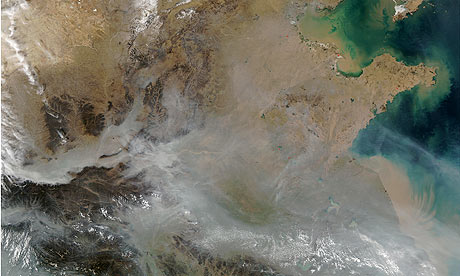
Sediments discharge into the Bo Hai Bay and western Yellow Sea colouring the surface waters caramel in this satellite view of China. Light brown hues show bare land, darker browns areas of vegetation. Photograph: Modis/Nasa
Almost 100 million people in south-west China will lose the land they live on within 35 years if soil erosion continues at its current rate, a nationwide survey has found.
Crops and water supplies are suffering serious damage as earth is washed and blown away across a third of the country, according to the largest-scale study for 60 years.
Harvests in the north-east, known as China's breadbasket, will fall 40% within half a century on current trends, even as the 1.3 billion population continues to grow.
While experts cited farming and forestry as the main causes, contributing to over a third of the area affected, the research team said erosion was damaging industrial areas and cities as well as remote rural land. About 4.5bn tonnes of soil are scoured away each year, at an estimated cost of 200bn yuan (£20bn) in this decade alone.
The poor will be worst hit, warns the report from China's bio-environment security research team, which worked on the survey for three years. Almost three-quarters of them already live in erosion-hit areas.
The country's 80,000 reservoirs are also affected, with sand and mud reducing their storage capacity each year. Like soil deposits along rivers, that increases the risk of flooding.
"If we don't conduct effective measures, erosion will cause major damage to social and economic development," Chen Lei, the director of the Ministry of Water Resources, told the official People's Daily newspaper.
The state news agency Xinhua said more than 3.5m square kilometres were affected in total, with 1.6m square kilometres scoured by water and 2m square kilometres by wind.
Professor Mu Xingming of the Institute of Soil and Water Conservation told the Guardian that overpopulation was largely to blame. He said his analysis of north-east China over the last century showed the effects of increasing population density.
New roads and railways were also contributing to the problem and people were less aware of the need for environmental protection than in other countries, he added.
Mu cited the Yellow River as one of the areas worst hit. "Historically, it got its name because of its colour - because the water contains more mud and sand than other rivers. But now it's yellower because of human activities," he said.
Beijing has been concerned about the desertification of China's northern grasslands for many years, and scaled back logging after deforestation contributed to flooding along the Yangtze in the late 1990s. Mu said more work was needed to restore forests and grasslands and suggested humans would have to leave some areas entirely if they were to recover.



No comments:
Post a Comment